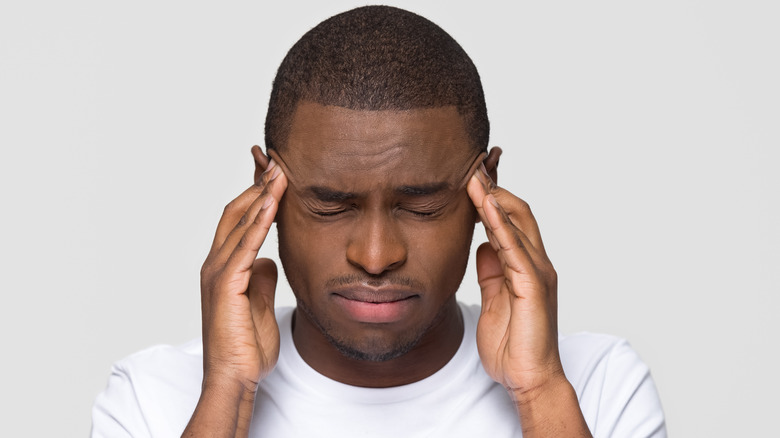This Is What Could Be Causing Your Tension Headache
If you've ever had a tension headache, then you are familiar with the dull pain that might feel like a tightness around your temples. According to Healthline, tension headaches are the most common kind of headache. Episodic tension headaches occur a few times a month, while headaches that occur more than 15 days a month are considered chronic. Both types can be either moderate or severe.
Treatment for tension headaches varies as it is based on severity. You can try over-the-counter painkillers, like aspirin and ibuprofen, which offer some relief (via Healthline). However, making positive lifestyle changes yields better results. For example, you can try getting more sleep or keeping a regular eating schedule. If you are under stress, relaxation techniques, such as meditation or yoga, may help you unwind, according to Psychology Today. In addition, a therapist can help you identify thought patterns that may lead to stress through a process called cognitive-behavioral therapy.
Experts think 'a heightened sensitivity to pain' may be to blame
The exact cause of tension headaches is not known. It was once thought they were the result of muscle contractions either in the head or around the neck. However, the Mayo Clinic points out that this may not be the case. Instead, experts think a more reasonable explanation for tension headaches is a "heightened sensitivity to pain" in those who are more susceptible to them.
That said, many people find that there are certain triggers for tension headaches, including eye strain, poor posture, or a lack of sleep, according to Healthline. Certain foods, such as alcohol or caffeine, as well as smoking and stress can also trigger tension headaches in some people. You can even trigger a tension headache if you sit in front of a computer for long periods of time or drive for a hours at a time.
If you experience a severe headache along with slurred speech, a high fever, and a loss of balance, you should contact your doctor because these could be a sign of something more serious, like a stroke (via Healthline).


